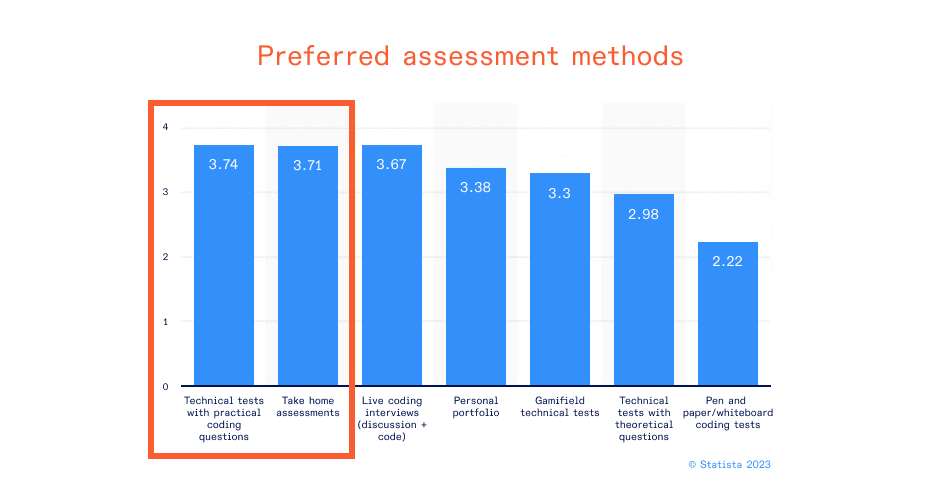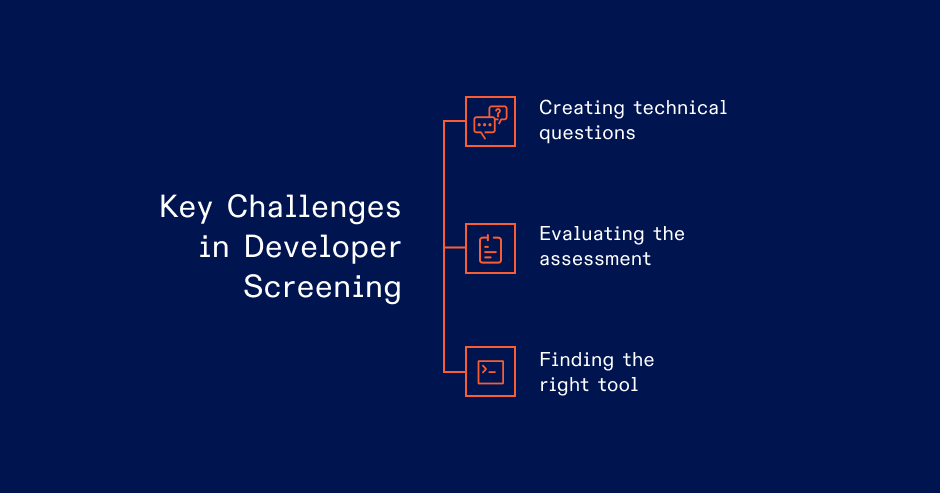The hunger for skilled developers knows no bounds. In your pursuit to fortify your team with aptitude and mastery, embracing the art of technical assessments stands paramount. These assessments wield the power to help you understand developer competencies, pinpoint exceptional talent, and steer judicious hiring choices.
Also read: Mastering agility in hiring - 3 easy steps to improve candidate selection process
In this article, we’ll delve into best practices for conducting technical assessments with precision. Forge ahead to expand your team with the finest tech talent.

Sign up to Index.dev platform now and start hiring proficiently assessed developers today→
Crafting effective technical assessments: Key insights
Technical assessments transcend mere checkpoints; they're a powerful tool to gauge a candidate's capacity to transform theoretical knowledge into tangible solutions. When creating these assessments, adhere to these strategic guidelines:
- Define clear objectives: Are you testing coding proficiency, algorithmic thinking, or language mastery? This clarity shapes your assessment's structure.
- Champion authenticity: Develop challenges mirroring actual developer experiences. This showcases candidates' problem-solving prowess and coding approach.
- Pick the right format: Coding exercises, take-home tasks, and pair programming sessions cater to different roles. Align the format with the skills being evaluated.
- Challenge balance: Create challenging assessments without overwhelming candidates. Tailor complexity based on role levels.
- Set expectations: Explicitly convey assessment goals, requirements, guidelines, and expectations for code quality and documentation.
- Harness automation: Employ testing tools to ensure objective evaluation. Assess functionality, edge cases, and compliance with requirements.
- Assess collaboration: Incorporate pair programming or interactive challenges to gauge teamwork and communication abilities.
Remember, technical assessments are your window into candidates' practical skills, problem-solving mindset, and collaborative prowess. Onboarding top-performing developers will be easier with these 3 key methods.
Also read: The cultural fit dilemma for technical recruiters: Embracing company values & team dynamics

Also read: 18 indispensable productivity tools for remote development teams
3 key methods to assess software developer skills
1. Code Portfolios & GitHub
Exploring a candidate's code portfolio and their activity on GitHub can unveil substantial insights into their expertise and engagement within the software engineering sphere. Here's how you can navigate this:
- Industry Involvement and Open Source Contributions: Probe whether the candidate actively shares industry insights through blogs or contributes to open-source projects. This demonstrates their commitment to continuous learning and community involvement.
- A Showcase of Proficiency: A well-curated portfolio should spotlight the candidate's standout accomplishments, adeptly employing relevant languages and software development skills.
GitHub offers a glimpse into developers' varied work, spanning mobile apps, games, scripts, plugins, and more. As a recruiter, before diving into developer code to verify how clean, readable and structured it is, start by assessing simple GitHub metrics, such as the number of followers (indicative of reputation), join date (reflecting experience), and keywords aligned with languages and technologies. Additionally, examine the number of repositories the candidate possesses to gain an understanding of their project diversity and scrutinize their public activity through contributions (pull requests, commits, and issue openings).
2. Live Coding Interviews
When it comes to understanding a candidate's true essence, nothing quite compares to a live interview. Even if candidates have rehearsed their responses to common interview queries, this is your opportunity to delve deeper. Observe not only their verbal responses but also their body language, communication finesse, and, most crucially, their passion for their craft. Here’s more how you can leverage in-person interviews:
- Unveiling technical proficiency: Your role in an in-person or live technical interview is to unravel the candidate's technical acumen and grasp their familiarity with tools and procedures pertinent to your company's operations.
- Harnessing online interview tools for live coding: Live coding sessions, facilitated by platforms like CoderPad, Codeshare, HackerRank, and CoderByte, offer an immersive experience. Candidates are presented with a task and are observed as they tackle it.
- Holistic evaluation: This approach enables a comprehensive assessment of the candidate's skills, values, and cultural fit within your organization.
3. Coding Tests
Coding tests stand out as one of the most powerful tools in your arsenal for effectively assessing developers prior to hiring. While discussions and portfolio reviews offer valuable insights, it's imperative to gauge a candidate's actual coding aptitude within an environment that enables direct observation. Creating a comprehensive coding test approach can benefit you in the following ways:
- Test Diverse Skill Sets: You can opt to evaluate candidates in a specific programming language or role, such as web development, or broaden the assessment to encompass multiple technologies like Java, Angular, Python, and more.
- Automated Code Analysis: These metrics encompass language proficiency, code design, readability, and overall robustness.
Moreover, you can embrace the take-home test methodology as an alternative. It offers insights into a developer's ability to execute a more extensive project and provides a platform for assessing their dedication to project completion. In such cases, the take-home test offers an opportunity for candidates to showcase their skills in a more relaxed environment.
Sign up to Index.dev platform now and start hiring proficiently assessed developers today→
Tips on how to avoid common assessment mistakes
In the quest for a more precise and fair assessments, consider these insights gathered from the experiences of candidates and hiring managers alike:
- Be mindful that unpaid assignments might be perceived as "giving away code." Strive for assessments that genuinely reflect skills without exploiting candidates.
- Recognize that take-home assignments can become excessively time-consuming. Strike a balance that respects candidates' efforts while providing an effective evaluation.
- Prevent misunderstandings by ensuring that expectations are crystal clear. Candidly communicate both stated and unstated requirements to uphold fairness.
- Avoid using one candidate's work as the yardstick for others, as it can inadvertently introduce interviewer bias. Gauge each candidate individually, grounded in their own merit.
- Cultivate a practice of delivering feedback to candidates. Silence following an extensive interview process can be demoralizing.
Next steps
Assessing software developers is pivotal, ensuring the right fit and minimizing risks. Choose Index.dev for streamlined global tech recruitment. Our platform provides rigorously vetted engineering talent, assessed for technical and soft skills through live interviews and coding challenges. Contact us to elevate your hiring process.